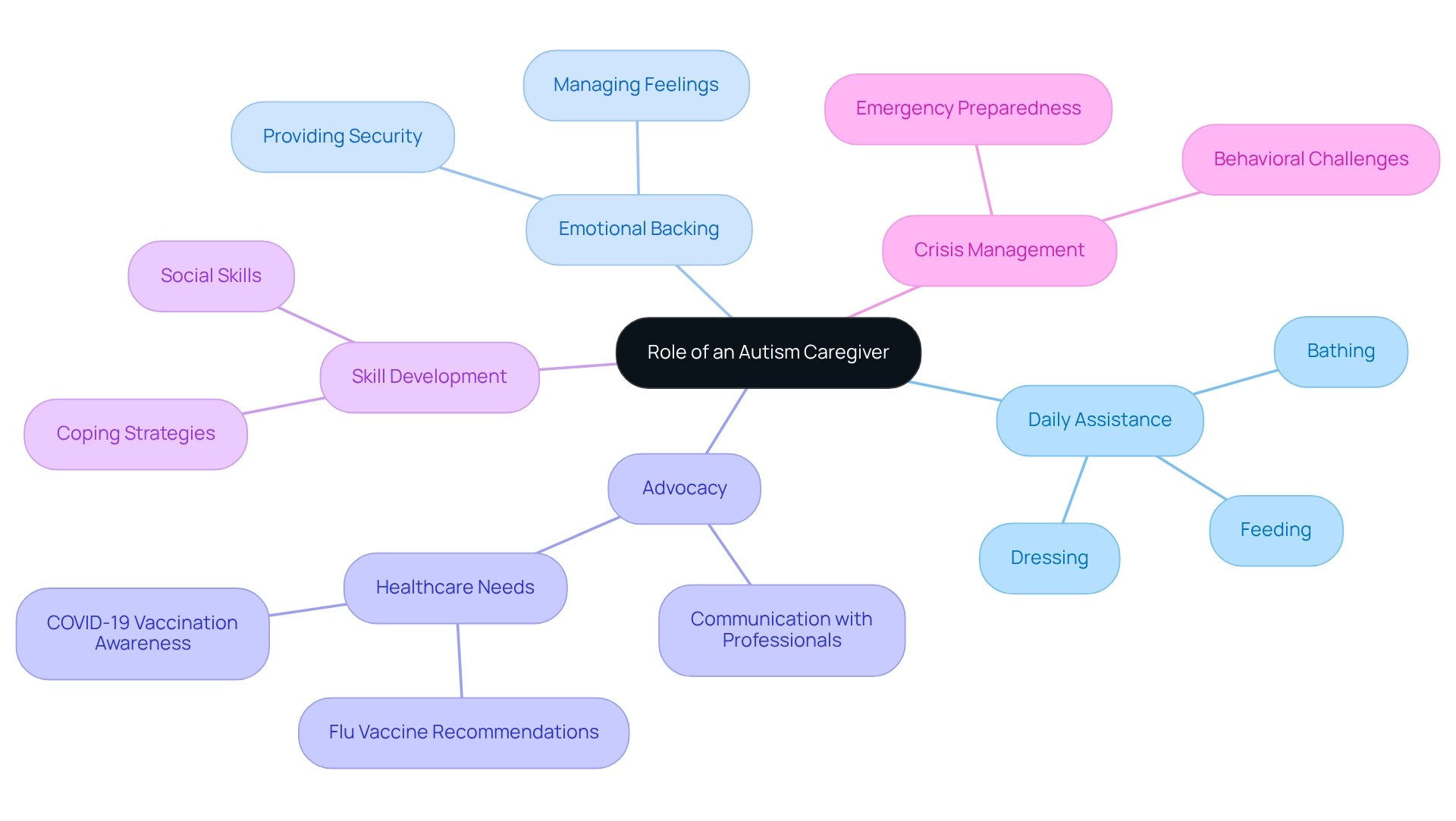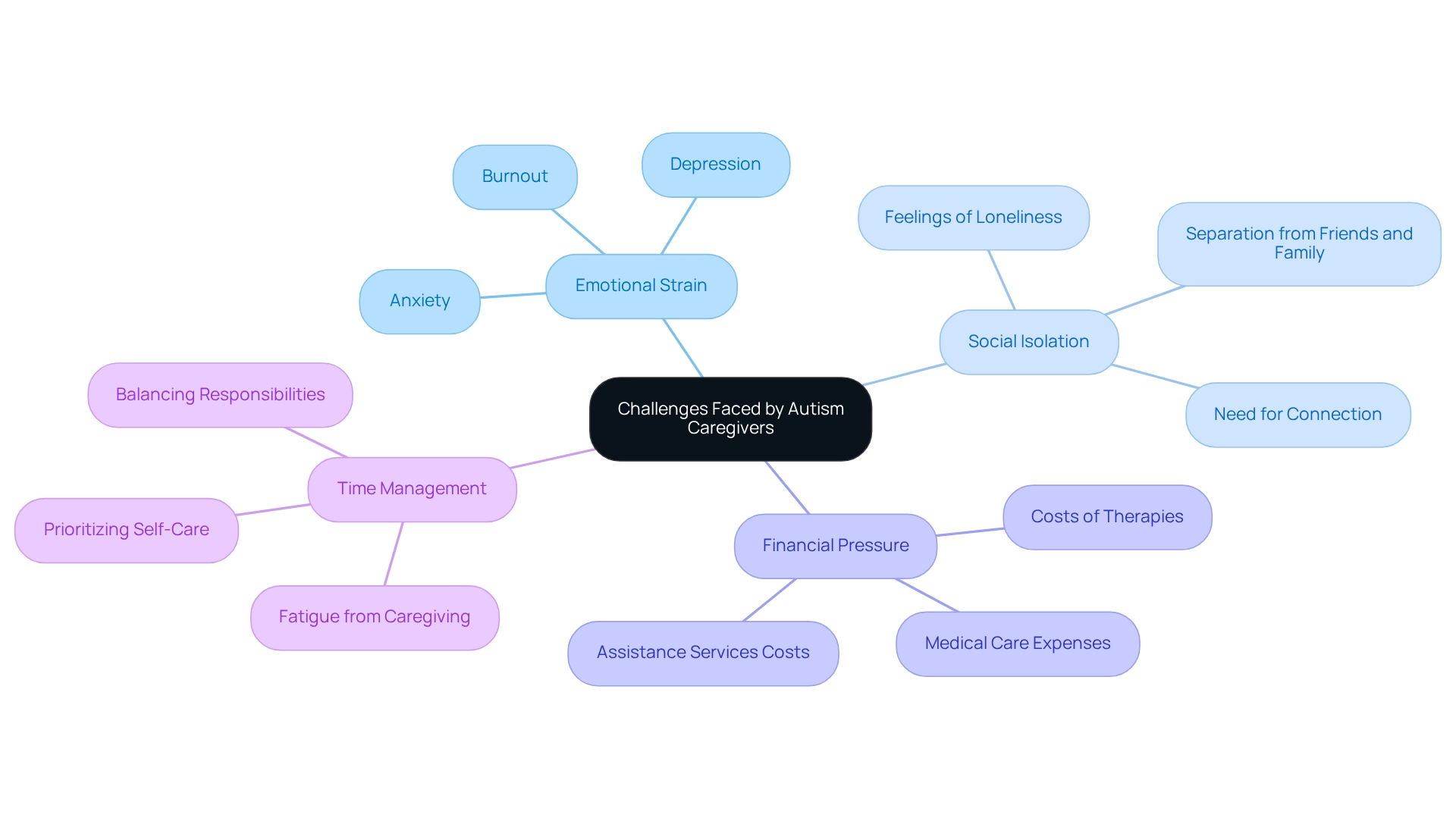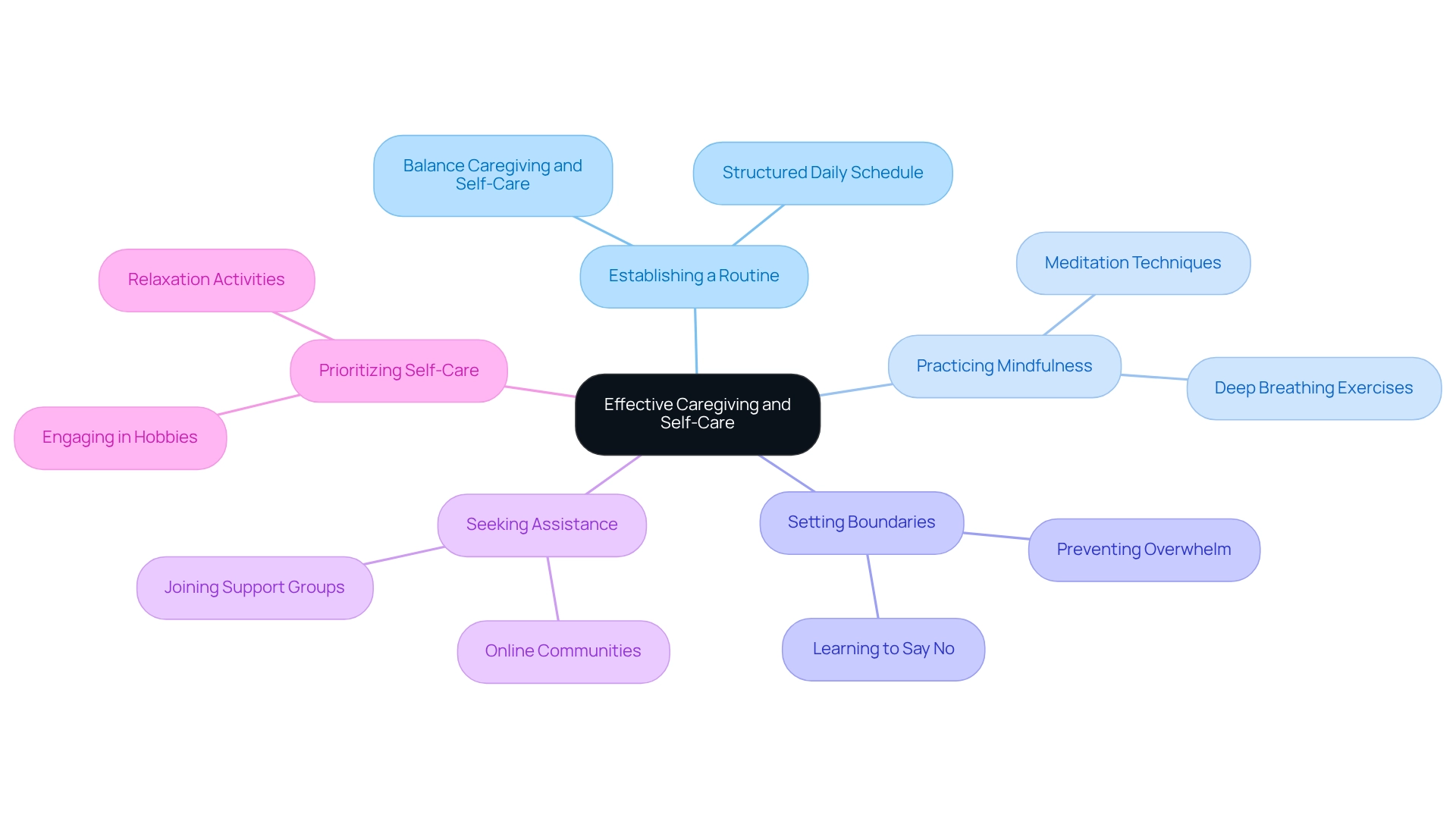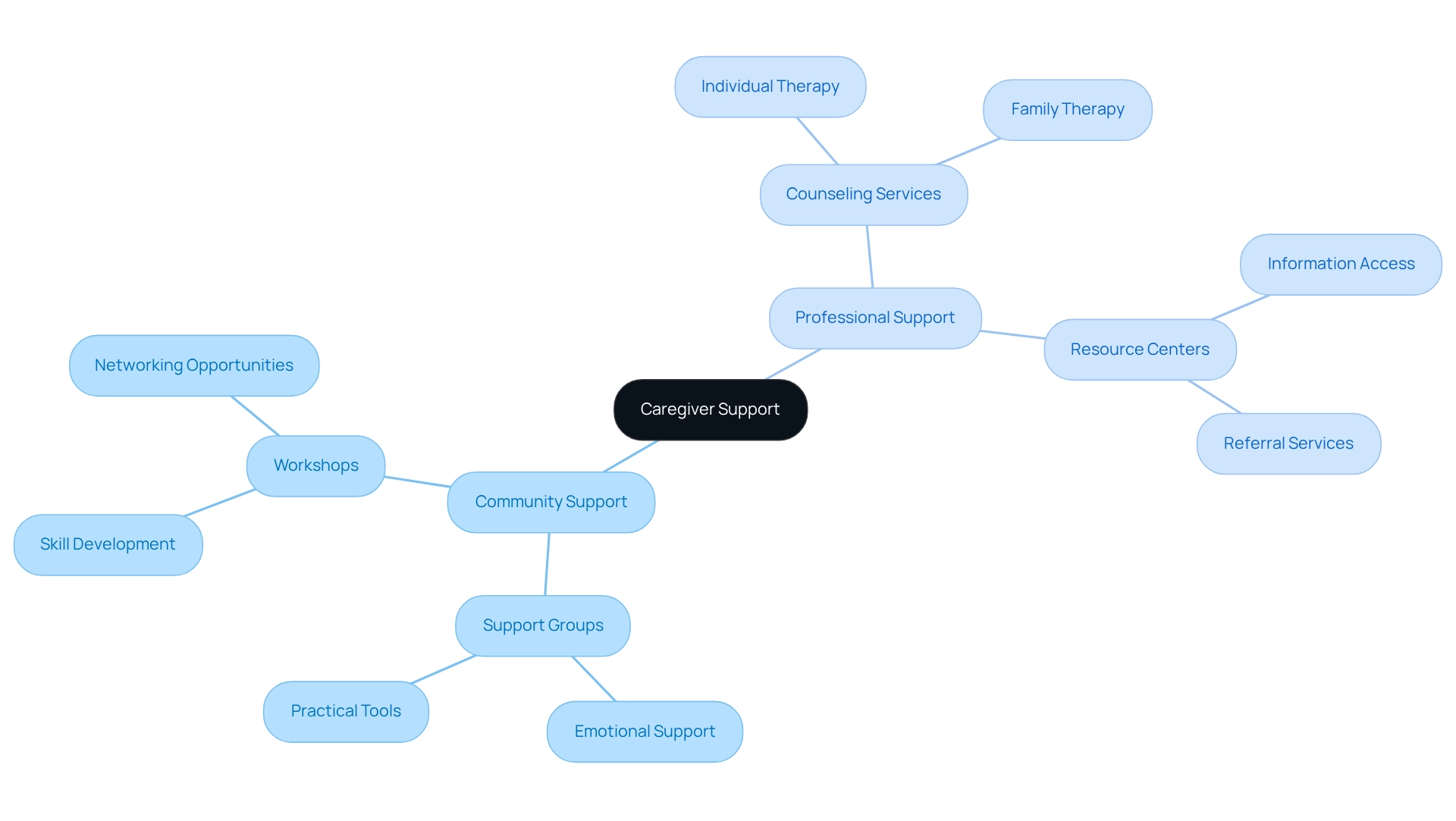Overview
This article offers valuable strategies for autism caregivers, aiming to enhance their support for individuals with autism while placing a strong emphasis on self-care.
- Establishing routines is a key focus, as it provides a sense of stability for both caregivers and those they support.
- Mindfulness practices are also highlighted, encouraging caregivers to stay present and manage stress effectively.
- Seeking assistance from others can alleviate some of the burdens, and leveraging community resources is essential for navigating the emotional and practical challenges of caregiving.
- By fostering a nurturing environment, caregivers can not only support their loved ones but also prioritize their own well-being.
Introduction
In the intricate world of autism care, caregivers emerge as unsung heroes, playing a pivotal role in the lives of individuals with autism spectrum disorder (ASD). Their responsibilities extend far beyond mere daily assistance; they provide emotional support, advocate for essential needs, and foster skill development, all while navigating the complexities of caregiving.
However, this rewarding journey is not without its challenges. Caregivers often grapple with emotional strain, social isolation, and financial pressures. To thrive in their roles, they must implement effective strategies for self-care and seek community and professional support, ensuring both their well-being and that of the individuals they care for.
This article delves into the multifaceted nature of autism caregiving, exploring the vital contributions caregivers make and the resources available to help them succeed.
Define the Role of an Autism Caregiver
Autism support providers play a vital role in the lives of individuals with autism spectrum disorder (ASD). The responsibilities of an autism caregiver significantly impact both the supporter and the person they assist. These responsibilities include:
- Daily Assistance: Supporters offer essential help with daily activities like dressing, bathing, and feeding, ensuring that individuals with ASD can maintain their personal hygiene and comfort.
- Emotional Backing: They provide crucial emotional support, helping individuals manage their feelings and challenges, which fosters a sense of security and understanding.
- Advocacy: As representatives, supporters communicate between those affected and educational or healthcare professionals, ensuring that the specific needs of individuals with ASD are recognized and addressed effectively. This advocacy is particularly important regarding health measures, like the CDC's recommendations for updated COVID-19 vaccinations and annual flu shots for everyone aged 6 months and older, which autism caregivers should be aware of to assist their loved ones.
- Skill Development: Autism caregivers help cultivate social skills and coping strategies through structured activities and positive reinforcement, which are essential for enhancing the individual's ability to interact with others and navigate daily life.
- Crisis Management: Being prepared for behavioral challenges and emergencies is a crucial aspect of being an autism caregiver. Autism caregivers employ calmness and effective strategies to handle crises, ensuring safety and stability for the individual, and their impact extends beyond everyday tasks as they play a significant role in shaping the quality of life for those with ASD.
Their advocacy efforts, especially during challenging times like the pandemic, underscore the need for accessible resources and accurate information for autism caregivers. For instance, Icylee Basketbill's support for her daughter illustrates the importance of clear communication and assistance for families facing the challenges of autism-related care. This advocacy is essential, particularly in understanding health measures that affect individuals with ASD. As Lindsey Shea from the A.J. Drexel Autism Institute emphasizes, grasping the broader implications of health measures, such as vaccinations, is critical for supporting individuals on the spectrum within their communities. The multifaceted role of those supporting people with ASD not only enhances the well-being of those with the condition but also fosters a nurturing environment that encourages growth and development.

Explore Challenges Faced by Autism Caregivers
Caring for individuals with autism can be a profoundly rewarding experience, yet it often comes with its own set of challenges that can weigh heavily on caregivers. Many find themselves grappling with emotional strain, as feelings of anxiety, depression, and burnout frequently arise from the relentless demands of caregiving. It's important to acknowledge these feelings and understand that you're not alone in this journey.
Social isolation is another common hurdle faced by caregivers. Many report a sense of separation from friends and family, leading to intensified feelings of loneliness. This isolation can make the caregiving experience of an autism caregiver even more daunting, highlighting the need for connection and support from others who understand your situation.
Financial pressure also looms large, as the costs associated with therapies, medical care, and assistance services can be overwhelming. It's crucial to explore available resources and support systems that can help alleviate some of this financial burden.
Additionally, time management can become a significant source of stress. Balancing caregiving responsibilities with personal and professional obligations often leads to fatigue. Finding ways to prioritize self-care and seek help can make a world of difference for autism caregivers, especially since many caregivers struggle with a lack of resources. Accessing suitable assistance services and information can be challenging, leaving you feeling inadequate at times. Remember, seeking out support and information is a vital step in your caregiving journey. By sharing your experiences and connecting with others, you can find the understanding and resources you need to navigate these challenges with greater ease.

Implement Strategies for Effective Caregiving and Self-Care
To enhance your caregiving effectiveness and nurture your personal well-being, consider these compassionate strategies:
- Establishing a routine can be a game changer. By creating a structured daily schedule, an autism caregiver can ensure that their caregiving tasks are balanced with essential time for self-care. This balance is crucial for maintaining your energy and focus.
- Practicing mindfulness is another powerful tool. Engaging in techniques such as meditation or deep breathing exercises can significantly reduce stress and improve your emotional resilience. Imagine taking just a few moments each day to center yourself amidst the demands of caregiving.
- Setting boundaries is vital for your well-being. Learning to say no to additional responsibilities can help prevent overwhelm, ensuring that you have dedicated time for your own self-care. As an autism caregiver, remember that it’s okay to prioritize your needs.
- Seeking assistance can also make a difference. Joining support groups or online communities allows you to share experiences and gain insights from others who understand the journey of an autism caregiver. You are not alone in this.
- Finally, prioritize self-care by making time for activities that rejuvenate you. Whether it’s exercise, indulging in hobbies, or simply relaxing with a good book, these moments of self-care are essential for your overall health.
By implementing these strategies, you can create a nurturing environment for both yourself and those you care for.

Leverage Community and Professional Support for Caregivers
Autism caregivers can find immense benefit from both community and professional support. By tapping into these resources, you can ease your journey and enhance your caregiving experience.
- Join Support Groups: Consider participating in local or online support groups. These spaces allow autism caregivers to share their experiences and strategies, fostering a sense of belonging and understanding. Their tailored guidance can be invaluable for an autism caregiver in navigating your unique situation, and many organizations offer workshops, seminars, and resources specifically designed for those supporting individuals with developmental disorders. Engaging with these groups can provide you with practical tools and insights as an autism caregiver, while connecting with other caregivers can offer emotional support and practical advice. Sharing your journey with others who understand, including an autism caregiver, can be incredibly uplifting. These platforms are great places to ask questions, share insights, and connect with others who are on a similar path.
By leveraging these resources, you can cultivate a supportive network that enriches your caregiving experience.

Conclusion
The role of autism caregivers is truly vital, encompassing a wide range of responsibilities that significantly enhance the lives of individuals with autism spectrum disorder (ASD). They provide daily assistance and emotional support, advocate for essential needs, and foster skill development, all instrumental in creating a nurturing environment that promotes growth. Yet, this journey often comes with challenges, including emotional strain, social isolation, and financial pressures. This underscores the urgent need for effective self-care strategies and robust support systems.
Implementing structured routines, practicing mindfulness, and establishing boundaries are essential strategies that empower caregivers to manage their responsibilities while prioritizing their well-being. Additionally, leveraging community and professional resources, such as support groups and local organizations, offers caregivers invaluable guidance and camaraderie. Connecting with others who share similar experiences not only alleviates feelings of isolation but also encourages the exchange of practical advice and emotional support.
Ultimately, recognizing and addressing the multifaceted nature of autism caregiving is crucial for the well-being of both caregivers and those they support. By fostering a culture of understanding and providing the necessary resources, society can better support these unsung heroes in their essential roles. Embracing the importance of self-care and community engagement will lead to more positive outcomes for individuals with ASD and their dedicated caregivers, ensuring a brighter future for all involved.
Frequently Asked Questions
What is the role of autism support providers?
Autism support providers play a vital role in the lives of individuals with autism spectrum disorder (ASD) by offering daily assistance, emotional backing, advocacy, skill development, and crisis management.
What kind of daily assistance do autism caregivers provide?
Autism caregivers provide essential help with daily activities such as dressing, bathing, and feeding, ensuring that individuals with ASD maintain their personal hygiene and comfort.
How do autism caregivers offer emotional support?
They provide crucial emotional support to help individuals manage their feelings and challenges, fostering a sense of security and understanding.
What is the importance of advocacy in autism caregiving?
Advocacy is important as supporters communicate the specific needs of individuals with ASD to educational and healthcare professionals, ensuring those needs are recognized and addressed effectively.
What health measures should autism caregivers be aware of?
Autism caregivers should be aware of health measures such as the CDC's recommendations for updated COVID-19 vaccinations and annual flu shots for everyone aged 6 months and older.
How do autism caregivers help with skill development?
They help cultivate social skills and coping strategies through structured activities and positive reinforcement, enhancing the individual's ability to interact with others and navigate daily life.
What is involved in crisis management for autism caregivers?
Crisis management involves being prepared for behavioral challenges and emergencies, employing calmness and effective strategies to ensure safety and stability for the individual.
Why is advocacy particularly important during challenging times like the pandemic?
Advocacy is essential during challenging times as it ensures accessible resources and accurate information for autism caregivers, helping them support their loved ones effectively.
How does the role of autism caregivers impact the quality of life for individuals with ASD?
The multifaceted role of autism caregivers enhances the well-being of those with ASD and fosters a nurturing environment that encourages growth and development.




